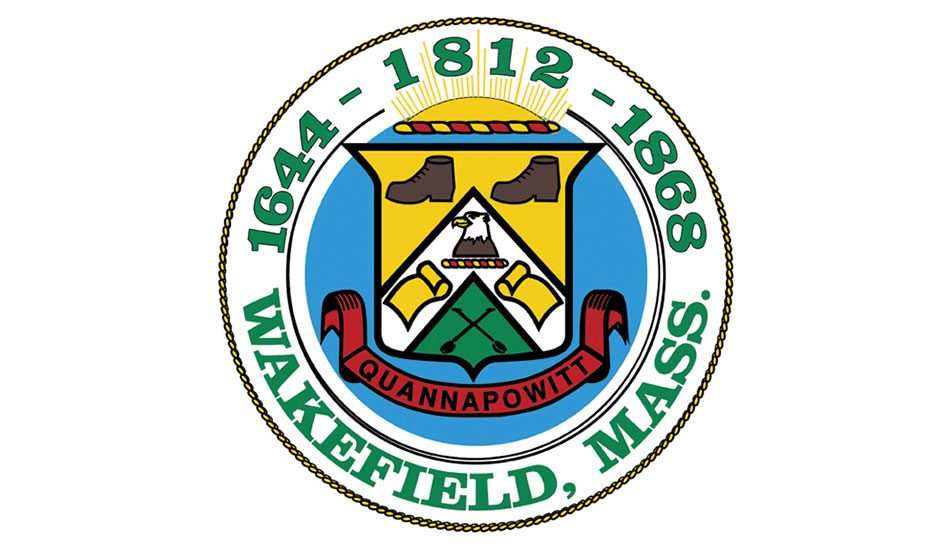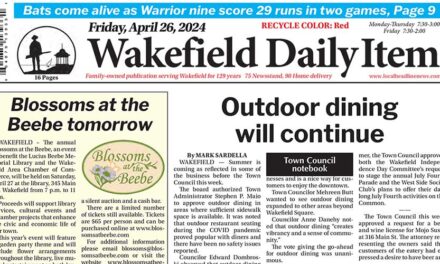By MARK SARDELLA
WAKEFIELD — The town can fly whatever flags it wants from its flagpoles and does not have to feel any obligation to allow opposing viewpoints as long as it declares that its flagpoles are exclusively an organ of government speech and are not a public forum.
That was how Town Counsel Thomas Mullen explained the implications of a recent United States Supreme Court decision on a case involving the city of Boston, which had refused to fly a Christian flag on a pole at City Hall Plaza.
Locally, the issue stemmed from a request by the Wakefield Human Rights Commission to fly the Pride and Juneteenth flags from various flagpoles around town. The Veterans Advisory Board took exception to the idea of flying any flag other than the POW-MIA flag on the same pole as the U.S. flag. They suggested that the town install new flagpoles for the purpose of flying alternative flags.
The town had been waiting for the Supreme Court decision to use it as guidance in adjusting the town’s own Flag Policy.
Mullen said that he had been concerned about what the Supreme Court case might mean for the town’s ability to take sides on substantive issues.
“If we raised the Black Lives Matter flag,” he worried, “would we also have to hoist the Confederate flag?”
But he explained that the recent Supreme Court decision in the Shurtleff v. City of Boston case means the town can take sides on an issue by raising a flag without having to worry about committing resources to the opposition. The only restraint, the Supreme Court noted, is entirely political not legal.
“You risk getting voted out of office if you go too far,” Mullen said.
Mullen noted that in the Boston case, the city had allowed one of its three flagpoles in front of City Hall to be used by any group using City Hall Plaza for an event. The city had conceded that City Hall Plaza was a public forum and had allowed the Pride Flag and a number of other flags to be flown. The city had never refused to fly a flag until activist Harold Shurtleff asked to fly what he called the Christian flag. Boston said no, Mullen explained, out of fear of running afoul of the Establishment Clause of the First Amendment, which prohibits the government from recognizing the establishment of a religion.
But the Supreme Court held that Boston had used the flagpole as a public forum and therefore had to allow it to be open to all comers. The Court indicated that the city could declare that the flagpole is not a public forum but is strictly an organ of government speech that only flies flags consistent with the sentiments and values of the city. And if people don’t like it, they can vote city officials out of office.
To that effect, Mullen quoted a line from the Supreme Court decision. “The Constitution relies first and foremost on the ballot box, not on rules against viewpoint discrimination to check the government when it speaks.”
Mullen suggested scrapping the town’s current Flag Policy so that he can write a new policy that declares that all of the town’s flag poles are strictly for government speech and are not public forums. That way, the town can raise such flags as express the official viewpoint of the town of Wakefield and no others, Mullen explained.
If people don’t like it, he added, “That’s why we have elections.”
Town Councilor Edward Dombroski, also an attorney, said that he was concerned about four people (a majority of the Town Council) deciding the official viewpoint of the town of Wakefield and what flags may be flown. He wondered if the town should stick to the United States flag as the single unifying flag representing everyone’s values.
Jonathan Chines cited the town’s “Proclamation of Acceptance and Openness” adopted in 2018 and said that the Pride and Juneteenth flags were important symbols of the policy and position of the town.
But Dombroski argued that the Pride and Juneteenth flags are the easy calls. Other requests might not be so easy, he said. He predicted that the town could be going down a very divisive path by adopting a policy that gives a majority of the Town Counsel the power to decide the official viewpoint of the community.
“I don’t know that that’s the direction that this body and those that follow should be headed in,” he said.
Mullen will present his proposed new flag policy at the Town Council’s next meeting on June 13, at which time board members are expected to further discuss and possibly vote on the new policy.





